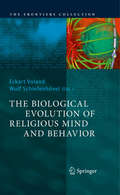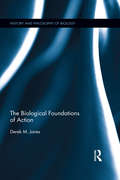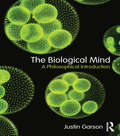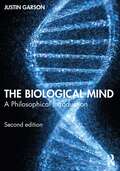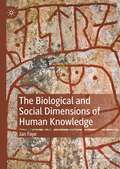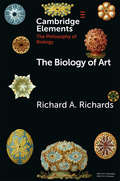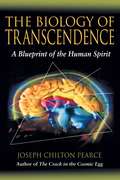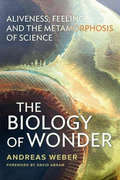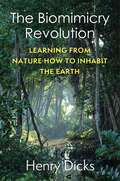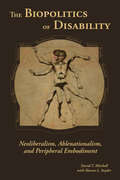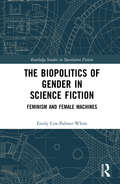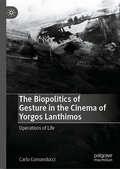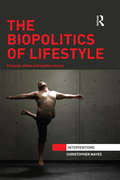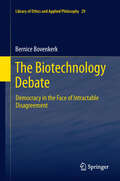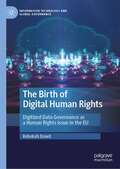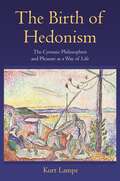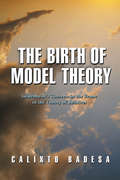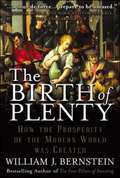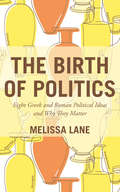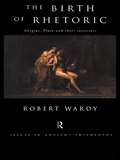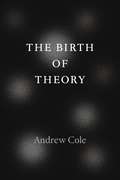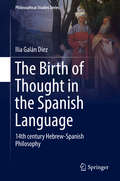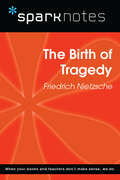- Table View
- List View
The Biological Evolution of Religious Mind and Behavior
by Eckart Voland Wulf SchiefenhövelIn a Darwinian world, religious behavior - just like other behaviors - is likely to have undergone a process of natural selection in which it was rewarded in the evolutionary currency of reproductive success. This book aims to provide a better understanding of the social scenarios in which selection pressure led to religious practices becoming an evolved human trait, i.e. an adaptive answer to the conditions of living and surviving that prevailed among our prehistoric ancestors. This aim is pursued by a team of expert authors from a range of disciplines. Their contributions examine the relevant physiological, emotional, cognitive and social processes. The resulting understanding of the functional interplay of these processes gives valuable insights into the biological roots and benefits of religion.
The Biological Foundations of Action (History and Philosophy of Biology)
by Derek M JonesPhilosophers have traditionally assumed that the difference between active and passive movement could be explained by the presence or absence of an intention in the mind of the agent. This assumption has led to the neglect of many interesting active behaviors that do not depend on intentions, including the "mindless" actions of humans and the activities of non-human animals. In this book Jones offers a broad account of agency that unifies these cases. The book addresses a range of questions, including: When are movements properly attributed to whole agents, rather than to their parts? What does it mean for an agent to guide its action? What distinguishes agents from other complex systems? What is the relationship between action and adaptive behavior? And why might the study of living systems be the key to understanding agency? This book makes an important contribution to current philosophical debate on the nature and origins of agency. It defines action as a uniquely biological process and recasts human intentional action as a specialized case of a broader and more common phenomenon than has been previously assumed. Uniting findings from philosophy, cognitive science, psychology, biology, computer science, complexity theory and ethology, this book will be of interest to students and scholars working in these areas.
The Biological Mind: A Philosophical Introduction
by Justin GarsonFor some, biology explains all there is to know about the mind. Yet many big questions remain: is the mind shaped by genes or the environment? If mental traits are the result of adaptations built up over thousands of years, as evolutionary psychologists claim, how can such claims be tested? If the mind is a machine, as biologists argue, how does it allow for something as complex as human consciousness? The Biological Mind: A Philosophical Introduction explores these questions and more, using the philosophy of biology to introduce and assess the nature of the mind. Drawing on the four key themes of evolutionary biology; molecular biology and genetics; neuroscience; and biomedicine and psychiatry Justin Garson addresses the following key topics: moral psychology, altruism and levels of selection evolutionary psychology and modularity genes, environment and the nature-nurture debate neuroscience, reductionism and the relation between biology and free will function, selection and mental representation psychiatric classification and the maladapted mind. Extensive use of examples and case studies is made throughout the book, and additional features such as chapter summaries, annotated further reading and a glossary make this an indispensable introduction to those teaching philosophy of mind and philosophy of psychology. It will also be an excellent resource for those in related fields such as biology.
The Biological Mind: A Philosophical Introduction
by Justin GarsonFor some, biology explains all there is to know about the mind. Yet many big questions remain: Is the mind shaped by genes or the environment? If mental traits are the result of adaptations built up over thousands of years, as evolutionary psychologists claim, how can such claims be tested? If the mind is a machine, as biologists argue, how does it allow for something as complex as human thought? Revised and updated to take account of new developments in the field, The Biological Mind: A Philosophical Introduction explores these questions and more, using the philosophy of biology to introduce and assess the nature of the mind. Justin Garson addresses the following key topics: moral psychology, altruism, and levels of selection; evolutionary psychology and the adaptationism debate; genes, environment, and the nature–nurture debate; natural selection and mental representation; psychiatric classification and the maladapted mind. This second edition includes three new chapters on race, sex, and human nature as well as new sections on group and kin selection, psychological altruism, and cultural evolution. Including chapter summaries, annotated further readings, a glossary of terms, and examples and case studies throughout, this is an indispensable introduction for those teaching philosophy of mind, philosophy of psychology, and philosophy of biology. It will also be an excellent resource for those in related fields such as biology.
The Biological and Social Dimensions of Human Knowledge
by Jan FayeTraditionally, philosophers have argued that epistemology is a normative discipline and therefore occupied with an a priori analysis of the necessary and sufficient conditions that a belief must fulfill to be acceptable as knowledge. But such an approach makes sense only if human knowledge has some normative features, which conceptual analysis is able to disclose. As it turns out, philosophers have not been able to find such features unless they are very selective in their choice of examples of knowledge. Much of what we intuitively think functions as knowledge, both in human and non-human animals, does not share these normative features.The purpose of this book is to demonstrate that natural selection has adapted human sense impressions to deliver reliable information without meeting the traditional commitments for having knowledge. In connection with memory, sensory and bodily information provides an animal with experiential knowledge. Experiential knowledge helps an animal to navigate its environment. Moreover, experiential knowledge has different functions depending on whether the deliverance of information stems from the organism’s external or internal senses.
The Biology of Art (Elements in the Philosophy of Biology)
by Richard A. RichardsBiological accounts of art typically start with evolutionary, psychological or neurobiological theories. These approaches might be able to explain many of the similarities we see in art behaviors within and across human populations, but they don't obviously explain the differences we also see. Nor do they give us guidance on how we should engage with art, or the conceptual basis for art. A more comprehensive framework, based also on the ecology of art and how art behaviors get expressed in engineered niches, can help us better understand the full range of art behaviors, their normativity and conceptual basis.
The Biology of Transcendence: A Blueprint of the Human Spirit
by Joseph Chilton PearceUses new research about the brain to explore how we can transcend our current physical and cultural limitations • Reveals that transcendence of current modes of existence requires the dynamic interaction of our fourth and fifth brains (intellect and intelligence) • Explores the idea that Jesus, Lao-tzu, and other great beings in history are models of nature’s possibility and our ability to achieve transcendence • 17,000 sold in hardcover since April 2002 Why do we seem stuck in a culture of violence and injustice? How is it that we can recognize the transcendent ideal represented by figures such as Jesus, Lao-tzu, and many others who have walked among us and yet not seem to reach the same state? In The Biology of Transcendence Joseph Chilton Pearce examines the current biological understanding of our neural organization to address how we can go beyond the limitations and constraints of our current capacities of body and mind--how we can transcend. Recent research in the neurosciences and neurocardiology identifies the four neural centers of our brain and indicates that a fifth such center is located in the heart. This research reveals that the evolutionary structure of our brain and its dynamic interactions with our heart are designed by nature to reach beyond our current evolutionary capacities. We are quite literally, made to transcend. Pearce explores how this “biological imperative” drives our life into ever-greater realms of being--even as the “cultural imperative” of social conformity and behavior counters this genetic heritage, blocks our transcendent capacities, and breeds violence in all its forms. The conflict between religion and spirit is an important part of this struggle. But each of us may overthrow these cultural imperatives to reach “unconflicted behavior,” wherein heart and mind-brain resonate in synchronicity, opening us to levels of possibility beyond the ordinary.
The Biology of Wonder: Aliveness, Feeling and the Metamorphosis of Science
by Andreas WeberA new way of understanding our place in the web of life from a scholar praised for his “graceful prose” (Publishers Weekly).The disconnection between humans and nature is perhaps one of the most fundamental problems faced by our species today. This schism is arguably the root cause of most of the environmental catastrophes unraveling around us. Until we come to terms with the depths of our alienation, we will continue to fail to understand that what happens to nature also happens to us.In The Biology of Wonder Andreas Weber proposes a new approach to the biological sciences that puts the human back in nature. He argues that feelings and emotions, far from being superfluous to the study of organisms, are the very foundation of life. From this basic premise flows the development of a "poetic ecology" which intimately connects our species to everything that surrounds us—showing that subjectivity and imagination are prerequisites of biological existence.Written by a leader in the emerging fields of biopoetics and biosemiotics, The Biology of Wonder demonstrates that there is no separation between us and the world we inhabit, and in so doing it validates the essence of our deep experience. By reconciling science with meaning, expression, and emotion, this landmark work brings us to a crucial understanding of our place in the rich and diverse framework of life—a revolution for biology as groundbreaking as the theory of relativity for physics.“Grounded in science, yet eloquently narrated, this is a groundbreaking book. Weber’s visionary work provides new insight into human/nature interconnectedness and the dire consequences we face by remaining disconnected.” —Richard Louv, author of Last Child in the Woods
The Biomimicry Revolution: Learning from Nature How to Inhabit the Earth
by Henry DicksModernity is founded on the belief that the world we build is a human invention, not a part of nature. The ecological consequences of this idea have been catastrophic. We have laid waste to natural ecosystems, replacing them with fundamentally unsustainable human designs. With time running out to address the environmental crises we have caused, our best path forward is to turn to nature for guidance.In this book, Henry Dicks explores the philosophical significance of a revolutionary approach to sustainable innovation: biomimicry. The term describes the application and adaptation of strategies found in nature to the development of artificial products and systems, such as passive cooling techniques modeled on termite mounds or solar cells modeled on leaves. Dicks argues that biomimicry, typically seen as just a design strategy, can also serve as the basis for a new environmental philosophy that radically alters how we understand and relate to the natural world. By showing how we can imitate, emulate, and learn from nature, biomimicry points us toward a genuinely sustainable way of inhabiting the earth.Rooted in philosophy, The Biomimicry Revolution has profound implications spanning the natural sciences, design, architecture, sustainability studies, science and technology studies, and the environmental humanities. It presents a sweeping reconception of what philosophy can be and offers a powerful new vision of terrestrial existence.
The Biopolitics Of Disability: Neoliberalism, Ablenationalism, And Peripheral Embodiment
by David T. MitchellIn the neoliberal era, when human worth is measured by its relative utility within global consumer culture, selected disabled people have been able to gain entrance into late capitalist culture. The Biopolitics of Disability terms this phenomenon "ablenationalism" and asserts that "inclusion" becomes meaningful only if disability is recognized as providing modes of living that are alternatives to governing norms of productivity and independence. Thus, the book pushes beyond questions of impairment to explore how disability subjectivities create new forms of embodied knowledge and collective consciousness. The focus is on the emergence of new crip/queer subjectivities at work in disability arts, disability studies pedagogy, independent and mainstream disability cinema (e. g. , Midnight Cowboy), internet-based medical user groups, anti-normative novels of embodiment (e. g. , Richard Powers's The Echo-Maker) and, finally, the labor of living in "non-productive" bodies within late capitalism.
The Biopolitics of Gender in Science Fiction: Feminism and Female Machines (Routledge Studies in Speculative Fiction)
by Emily Cox-Palmer-WhiteQuestioning essentialist forms of feminist discourse, this work develops an innovative approach to gender and feminist theory by drawing together the work of key feminist and gender theorists, such as Judith Butler and Donna Haraway, and the biopolitical philosophy of Giorgio Agamben and Gilles Deleuze. By analysing representations of the female cyborg figure, the gynoid, in science fiction literature, television, film and videogames, the work acknowledges its normative and subversive properties while also calling for a new feminist politics of selfhood and autonomy implied by the posthuman qualities of the female machine.
The Biopolitics of Gesture in the Cinema of Yorgos Lanthimos: Operations of Life
by Carlo ComanducciThis book establishes a dialogue between Yorgos Lanthimos and Giorgio Agamben as a way of interpreting the “weird” roles, rules, and rituals that define and discipline lives in Lanthimos’s early works, from Kinetta to The Killing of a Sacred Deer. By exploring the resonance between Lanthimos’s cinema and Agamben’s understanding of gesture, this work wants to contribute to a theory of performative power under biopolitical and spectacular modalities of government, focussing in particular on Agamben’s ideas of operativity and inoperativity and on the construction and deconstruction of the white bourgeois, normative, and consensual “formality” of life. In turn, the role gestures play in Lanthimos’s critique of patriarchy and of neoliberal forms of vulnerabilisation is used to question Agamben’s unspoken affinities with contemporary radical feminism and queer theory.
The Biopolitics of Lifestyle: Foucault, Ethics and Healthy Choices (Interventions)
by Christopher MayesA growing sense of urgency over obesity at the national and international level has led to a proliferation of medical and non-medical interventions into the daily lives of individuals and populations. This work focuses on the biopolitical use of lifestyle to govern individual choice and secure population health from the threat of obesity. The characterization of obesity as a threat to society caused by the cumulative effect of individual lifestyles has led to the politicization of daily choices, habits and practices as potential threats. This book critically examines these unquestioned assumptions about obesity and lifestyle, and their relation to wider debates surrounding neoliberal governmentality, biopolitical regulation of populations, discipline of bodies, and the possibility of community resistance. The rationale for this book follows Michel Foucault’s approach of problematization, addressing the way lifestyle is problematized as a biopolitical domain in neoliberal societies. Mayes argues that in response to the threat of obesity, lifestyle has emerged as a network of disparate knowledges, relations and practices through which individuals are governed toward the security of the population’s health. Although a central focus is government health campaigns, this volume demonstrates that the network of lifestyle emanates from a variety of overlapping domains and disciplines, including public health, clinical medicine, media, entertainment, school programs, advertising, sociology and ethics. This book offers a timely critique of the continued interventions into the lives of individuals and communities by government agencies, private industries, medical and non-medical experts in the name of health and population security and will be of interests to students and scholars of critical international relations theory, health and bioethics and governmentality studies.
The Biotechnology Debate
by Bernice BovenkerkThis book grounds deliberative democratic theory in a more refined understanding of deliberative practice, in particular when dealing with intractable moral disagreement regarding novel technologies. While there is an ongoing, vibrant debate about the theoretical merits of deliberative democracy on the one hand, and more recently, empirical studies of specific deliberative exercises have been carried out, these two discussions fail to speak to one another. Debates about animal and plant biotechnology are examined as a paradigmatic case for intractable disagreement in today's pluralistic societies. This examination reveals that the disagreements in this debate are multi-faceted and multi-dimensional and can often be traced to fundamental disagreements about values or worldviews. "One of the acute insights to emerge from this examination is that deliberation can serve different purposes vis-à-vis different types of problem. In the case of deeply unstructured problems, like the modern biotechnology debate, the aim of inclusion is more appropriate than the aim of consensus. This book highlights the importance of political culture and broader institutional settings in shaping the capacity and propensity of citizens to engage in deliberation and the degree to which governments are prepared to relinquish authority to deliberative mini-publics." Robyn Eckersley, University of Melbourne, Australia
The Birth of Computer Vision
by James E. DobsonA revealing genealogy of image-recognition techniques and technologies Today&’s most advanced neural networks and sophisticated image-analysis methods come from 1950s and &’60s Cold War culture—and many biases and ways of understanding the world from that era persist along with them. Aerial surveillance and reconnaissance shaped all of the technologies that we now refer to as computer vision, including facial recognition. The Birth of Computer Vision uncovers these histories and finds connections between the algorithms, people, and politics at the core of automating perception today.James E. Dobson reveals how new forms of computerized surveillance systems, high-tech policing, and automated decision-making systems have become entangled, functioning together as a new technological apparatus of social control. Tracing the development of a series of important computer-vision algorithms, he uncovers the ideas, worrisome military origins, and lingering goals reproduced within the code and the products based on it, examining how they became linked to one another and repurposed for domestic and commercial uses. Dobson includes analysis of the Shakey Project, which produced the first semi-autonomous robot, and the impact of student protest in the early 1970s at Stanford University, as well as recovering the computer vision–related aspects of Frank Rosenblatt&’s Perceptron as the crucial link between machine learning and computer vision.Motivated by the ongoing use of these major algorithms and methods, The Birth of Computer Vision chronicles the foundations of computer vision and artificial intelligence, its major transformations, and the questionable legacy of its origins. Cover alt text: Two overlapping circles in cream and violet, with black background. Top is a printed circuit with camera eye; below a person at a 1977 computer.
The Birth of Digital Human Rights: Digitized Data Governance as a Human Rights Issue in the EU (Information Technology and Global Governance)
by Rebekah DowdThis book considers contested responsibilities between the public and private sectors over the use of online data, detailing exactly how digital human rights evolved in specific European states and gradually became a part of the European Union framework of legal protections. The author uniquely examines why and how European lawmakers linked digital data protection to fundamental human rights, something heretofore not explained in other works on general data governance and data privacy. In particular, this work examines the utilization of national and European Union institutional arrangements as a location for activism by legal and academic consultants and by first-mover states who legislated digital human rights beginning in the 1970s. By tracing the way that EU Member States and non-state actors utilized the structure of EU bodies to create the new norm of digital human rights, readers will learn about the process of expanding the scope of human rights protections within multiple dimensions of European political space. The project will be informative to scholar, student, and layperson, as it examines a new and evolving area of technology governance – the human rights of digital data use by the public and private sectors.
The Birth of Hedonism: The Cyrenaic Philosophers and Pleasure as a Way of Life
by Kurt LampeAccording to Xenophon, Socrates tried to persuade his associate Aristippus to moderate his excessive indulgence in wine, women, and food, arguing that only hard work can bring happiness. Aristippus wasn't convinced. Instead, he and his followers espoused the most radical form of hedonism in ancient Western philosophy. Before the rise of the better known but comparatively ascetic Epicureans, the Cyrenaics pursued a way of life in which moments of pleasure, particularly bodily pleasure, held the highest value. In The Birth of Hedonism, Kurt Lampe provides the most comprehensive account in any language of Cyrenaic ideas and behavior, revolutionizing the understanding of this neglected but important school of philosophy.The Birth of Hedonism thoroughly and sympathetically reconstructs the doctrines and practices of the Cyrenaics, who were active between the fourth and third centuries BCE. The book examines not only Aristippus and the mainstream Cyrenaics, but also Hegesias, Anniceris, and Theodorus. Contrary to recent scholarship, the book shows that the Cyrenaics, despite giving primary value to discrete pleasurable experiences, accepted the dominant Greek philosophical belief that life-long happiness and the virtues that sustain it are the principal concerns of ethics. The book also offers the first in-depth effort to understand Theodorus's atheism and Hegesias's pessimism, both of which are extremely unusual in ancient Greek philosophy and which raise the interesting question of hedonism's relationship to pessimism and atheism. Finally, the book explores the "new Cyrenaicism" of the nineteenth-century writer and classicist Walter Pater, who drew out the enduring philosophical interest of Cyrenaic hedonism more than any other modern thinker.
The Birth of Model Theory: Löwenheim's Theorem in the Frame of the Theory of Relatives
by Calixto BadesaLöwenheim's theorem reflects a critical point in the history of mathematical logic, for it marks the birth of model theory--that is, the part of logic that concerns the relationship between formal theories and their models. However, while the original proofs of other, comparably significant theorems are well understood, this is not the case with Löwenheim's theorem. For example, the very result that scholars attribute to Löwenheim today is not the one that Skolem--a logician raised in the algebraic tradition, like Löwenheim--appears to have attributed to him. In The Birth of Model Theory, Calixto Badesa provides both the first sustained, book-length analysis of Löwenheim's proof and a detailed description of the theoretical framework--and, in particular, of the algebraic tradition--that made the theorem possible. Badesa's three main conclusions amount to a completely new interpretation of the proof, one that sharply contradicts the core of modern scholarship on the topic. First, Löwenheim did not use an infinitary language to prove his theorem; second, the functional interpretation of Löwenheim's normal form is anachronistic, and inappropriate for reconstructing the proof; and third, Löwenheim did not aim to prove the theorem's weakest version but the stronger version Skolem attributed to him. This book will be of considerable interest to historians of logic, logicians, philosophers of logic, and philosophers of mathematics.
The Birth of Plenty: How the Prosperity of the Modern World Was Created
by William J. BernsteinA compact and immensely readable economic, political, military, and institutional history of our civilization that is a tour de force.
The Birth of Politics: Eight Greek and Roman Political Ideas and Why They Matter
by Melissa LaneIn The Birth of Politics, Melissa Lane introduces the reader to the foundations of Western political thought, from the Greeks, who invented democracy, to the Romans, who created a republic and then transformed it into an empire. Tracing the origins of our political concepts from Socrates to Plutarch to Cicero, Lane reminds us that the birth of politics was a story as much of individuals as ideas. Scouring the speeches of lawyers alongside the speculations of philosophers, and the reflections of ex-slaves next to the popular comedies and tragedies of the Greek and Roman stages, this book brings ancient ideas to life in unexpected ways. Lane shows how the Greeks and Romans defined politics with distinctive concepts, vocabulary, and practices—all of which continue to influence politics and political aspirations around the world today. She focuses on eight political ideas from the Greco-Roman world that are especially influential today: justice, virtue, constitution, democracy, citizenship, cosmopolitanism, republic, and sovereignty. Lane also describes how the ancient formulations of these ideas often challenge widely held modern assumptions—for example, that it is possible to have political equality despite great economic inequality, or that political regimes can be indifferent to the moral character of their citizens. A stimulating introduction to the origins of our political ideas and ideals, The Birth of Politics demonstrates how much we still have to learn from the political genius of the Greeks and Romans.
The Birth of Politics: Eight Greek and Roman Political Ideas and Why They Matter
by Melissa LaneIn The Birth of Politics, Melissa Lane introduces the reader to the foundations of Western political thought, from the Greeks, who invented democracy, to the Romans, who created a republic and then transformed it into an empire. Tracing the origins of our political concepts from Socrates to Plutarch to Cicero, Lane reminds us that the birth of politics was a story as much of individuals as ideas. Scouring the speeches of lawyers alongside the speculations of philosophers, and the reflections of ex-slaves next to the popular comedies and tragedies of the Greek and Roman stages, this book brings ancient ideas to life in unexpected ways. Lane shows how the Greeks and Romans defined politics with distinctive concepts, vocabulary, and practices--all of which continue to influence politics and political aspirations around the world today. She focuses on eight political ideas from the Greco-Roman world that are especially influential today: justice, virtue, constitution, democracy, citizenship, cosmopolitanism, republic, and sovereignty. Lane also describes how the ancient formulations of these ideas often challenge widely held modern assumptions--for example, that it is possible to have political equality despite great economic inequality, or that political regimes can be indifferent to the moral character of their citizens. A stimulating introduction to the origins of our political ideas and ideals, The Birth of Politics demonstrates how much we still have to learn from the political genius of the Greeks and Romans.
The Birth of Rhetoric: Gorgias, Plato and their Successors (Issues in Ancient Philosophy)
by Robert WardyWhat is rhetoric?Is it the capacity to persuade? Or is it 'mere' rhetoric: the ability to get others to do what the speaker wants, regardless of what they want? This is the rhetoric of ideological manipulation and political seduction. Rhetoric is for some a distinctive mode of communication; for others, whenever someone speaks, rhetoric is present.This book is devoted to helping readers understand these rival accounts, by showing how it has happened that there are so many conceptions of rhetoric. Any such approach must be rooted in classical antiquity, since our ideas of rhetoric are the product of a complicated historical process starting in ancient Greece. Greek rhetoric was born in bitter controversy. The figure of Gorgias is at the centre of that debate and of this book: he invites us to confront the terrifying, exhilarating possibility that persuasion is just power.
The Birth of Theory
by Andrew ColeModern theory needs a history lesson. Neither Marx nor Nietzsche first gave us theoryOCoHegel did. To support this contention, Andrew ColeOCOs "The Birth of Theory" presents a refreshingly clear and lively account of the origins and legacy of HegelOCOs dialectic as theory. Cole explains how Hegel boldly broke from modern philosophy when he adopted medieval dialectical habits of thought to fashion his own dialectic. While his contemporaries rejected premodern dialectic as outdated dogma, Hegel embraced both its emphasis on language as thought and its fascination with the categories of identity and difference, creating what we now recognize as theory, distinct from systematic philosophy. Not content merely to change philosophy, Hegel also used this dialectic to expose the persistent archaism of modern life itself, Cole shows, establishing a method of social analysis that has influenced everyone from Marx and the nineteenth-century Hegelians, to Nietzsche and Bakhtin, all the way to Deleuze and Jameson. aaaaaaaaaaaBy uncovering these theoretical filiations across time, "The Birth of Theory" will not only change the way we read Hegel, but also the way we think about the histories of theory. With chapters that powerfully reanimate the overly familiar topics of ideology, commodity fetishism, and political economy, along with a groundbreaking reinterpretation of HegelOCOs famous master/slave dialectic, "The Birth of Theory" places the disciplines of philosophy, literature, and history in conversation with one another in an unprecedented way. Daring to reconcile the sworn enemies of Hegelianism and Deleuzianism, this timely book will revitalize dialectics for the twenty-first century. "
The Birth of Thought in the Spanish Language: 14th century Hebrew-Spanish Philosophy (Philosophical Studies Series #127)
by Ilia Galán DíezThis book takes readers on a philosophical discovery of a forgotten treasure, one born in the 14th century but which appears to belong to the 21st. It presents a critical, up-to-date analysis of Santob de Carrión, also known as Sem Tob, a writer and thinker whose philosophy arose in the Spain of the three great cultures: Jews, Christians, and Muslims, who then coexisted in peace. The author first presents a historical and cultural introduction that provides biographical detail as well as context for a greater understand of Santob's philosophy. Next, the book offers a dialogue with the work itself, which looks at politics, sociology, anthropology, psychology, ethics, aesthetics, metaphysics, and theodicy. The aim is not to provide an exhaustive analysis, or to comment on each and every verse, but rather to deal only with the most relevant for today’s world.Readers will discover how Santob believed knowledge must be dynamic, and tolerance fundamental, fleeing from dogma, since one cannot avoid a significant dose of moral and aesthetic relativism. Subjectivity, within its own codes, must seek a profound ethics, not puritanical but which serves to escape from general ill will. Santob offers a criticism of wealth and power that does not serve the people which appears to be totally relevant today. In spite of the fame he achieved in his own time, Santob has largely remained a vestige of the past. By the end of this book, readers will come to see why this important figure deserves to be more widely studied. Indeed, not only has this medieval Spanish philosopher searched for truth in an unstable, confused world of contradictions, but he has done so in a way that can still help us today.
The Birth of Tragedy (SparkNotes Philosophy Guide)
by SparkNotesThe Birth of Tragedy (SparkNotes Philosophy Guide) Making the reading experience fun! SparkNotes Philosophy Guides are one-stop guides to the great works of philosophy–masterpieces that stand at the foundations of Western thought. Inside each Philosophy Guide you&’ll find insightful overviews of great philosophical works of the Western world.
